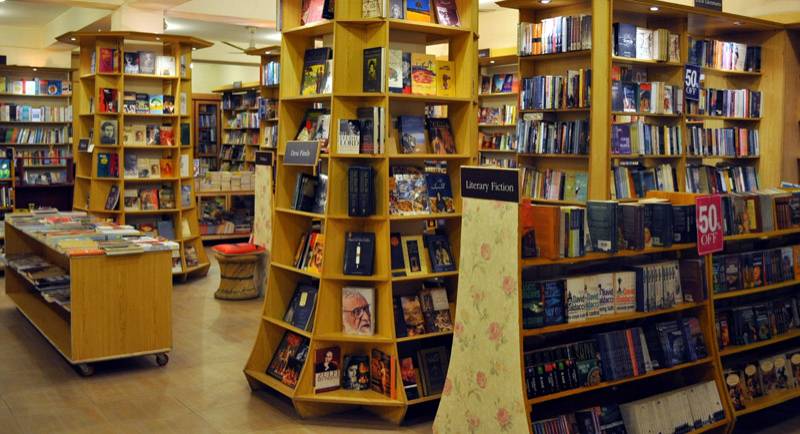
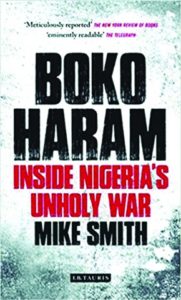
Boko Haram: Inside Nigeria’s Unholy War
Mike Smith
I.B. Tauris (2016), Rs2,918
An insurgency in Nigeria by the Islamist extremist group Boko Haram has left thousands dead, shaken Africa’s biggest country and worried the world. Yet they remain a mysterious?almost unknowable?organisation. Through exhaustive on-the-ground reporting, M.J. Smith takes readers inside the violence and provides the first in-depth account of the conflict. He traces Boko Haram from its beginnings as a small Islamist sect in Nigeria’s remote northeast, led by a baby-faced but charismatic preacher, to its transformation into a hydra-headed monster, deploying suicide bombers and abducting innocent schoolgirls. Much of the book is told through the eyes of Nigerians who have found themselves caught between the violence of a shadowy group of insurgents, brutal security forces accused of horrifying abuses and an inept government led by an accidental president. It includes the voices of a forgotten police officer left paralysed by an attack, women whose husbands have been murdered and a sword-wielding vigilante using charms to fend off insurgent bullets. It journeys through the sleaze and corruption that has robbed Africa’s biggest oil producer of its potential, making it such fertile ground for extremism. Along the way it questions whether there can be any end to the violence and the ways in which this might be achieved. Interspersed with history, this book delves into the roots of this unholy war being waged against the backdrop of an evolving extremist threat worldwide.
‘[Readers] get a vivid impression of the horrors associated with the group and the campaign against it, thanks to Mr Smith’s reporting-the book’s main strength...Considering the dearth of information available, this is a commendable first draft of history,’ says The Economist.
Mike Smith is news editor for Israel and the Palestinian territories for Agence France-Presse. He was based in Lagos from 2010-13 as AFP’s bureau chief for part of West Africa.
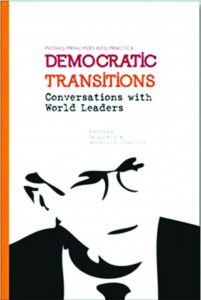
Democratic Transitions: Conversations with World Leaders
Sergio Bitar (Editor), Abraham F. Lowenthal (Editor)
Johns Hopkins Uni Press (2015)
Rs4,360
National leaders who played key roles in transitions to democratic governance reveal how these were accomplished in Brazil, Chile, Ghana, Indonesia, Mexico, the Philippines, Poland, South Africa, and Spain. Commissioned by the International Institute for Democracy and Electoral Assistance (International IDEA), these interviews shed fascinating light on how repressive regimes were ended and democracy took hold.
In probing conversations with Fernando Henrique Cardoso, Patricio Aylwin, Ricardo Lagos, John Kufuor, Jerry Rawlings, B. J. Habibie, Ernesto Zedillo, Fidel V. Ramos, Aleksander Kwa?niewski, Tadeusz Mazowiecki, F. W. de Klerk, Thabo Mbeki, and Felipe González, editors Sergio Bitar and Abraham F. Lowenthal focused on each leader’s principal challenges and goals as well as their strategies to end authoritarian rule and construct democratic governance.
Context-setting introductions by country experts highlight each nation’s unique experience as well as recurrent challenges all transitions faced. A chapter by Georgina Waylen analyzes the role of women leaders, often underestimated. A foreword by Tunisia’s former president, Mohamed Moncef Marzouki, underlines the book’s relevance in North Africa, West Asia, and beyond.
The editors’ conclusion distills lessons about how democratic transitions have been and can be carried out in a changing world, emphasizing the importance of political leadership. This unique book should be valuable for political leaders, civil society activists, journalists, scholars, and all who want to support democratic transitions.
Sergio Bitar, president of Chile’s Foundation for Democracy, is a political leader and public intellectual. Abraham F. Lowenthal, professor emeritus of the University of Southern California, was the founding director of the Inter-American Dialogue and the Wilson Center’s Latin American Program.
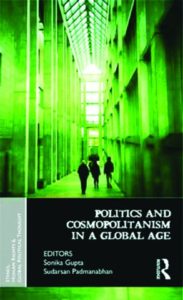
Politics and Cosmopolitanism in a Global Age
Edited by Sonika Gupta, Sudarsan Padmanabhan
Routledge India (2015)
Rs1,502
This book offers a unique reconceptualization of cosmopolitanism. It examines several themes that inform politics in a globalized era, including global governance, international law, citizenship, constitutionalism, community, domesticity, territory, sovereignty, and nationalism. The volume explores the specific philosophical and institutional challenges in constructing a cosmopolitan political community beyond the nation state. It reorients and decolonizes the boundaries of ‘cosmopolitanism’ and questions the contemporary discourse to posit inclusive alternatives. Presenting rich and diverse perspectives from across the world, the volume will interest scholars and students of politics and international relations, political theory, public policy, ethics, and philosophy.
Sonika Gupta is Associate Professor, Indian Institute of Technology Madras, India.
Sudarsan Padmanabhan is Associate Professor, Indian Institute of Technology Madras, India.
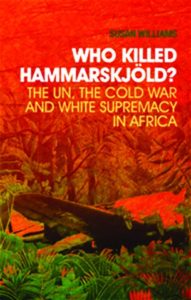
Who Killed Hammarskjöld? The UN, The Cold War and White Supremacy in Africa
Susan Williams
Hurst (2011), Rs2,303
One of the outstanding mysteries of the twentieth century, and one with huge political resonance, is the death of Dag Hammarskjöld and his UN team in a plane crash in central Africa in 1961. Just minutes after midnight, his aircraft plunged into thick forest in the British colony of Northern Rhodesia (Zambia), abruptly ending his mission to bring peace to the Congo. Many around the world suspected sabotage, accusing multinationals and the governments of Britain, Belgium, the USA and South Africa of involvement in the disaster. These suspicions have never gone away.
Susan Williams argues that the official inquiry by the Rhodesian government was a massive cover-up that suppressed and dismissed a mass of crucial evidence pointing to foul play. Who Killed Hammarskjöld? follows the author on her intriguing and often frightening research, which unearthed a mass of new and hitherto secret documentary and photographic evidence.
At the heart of this book is Hammarskjöld himself – a courageous and complex idealist, who sought to shield the newly independent nations of the world from the predatory instincts of the Great Powers. It reveals that the conflict in the Congo was driven not so much by internal divisions, as by the Cold War and by the West’s determination to keep real power from the hands of the post-colonial governments of Africa. It shows, too, that the British settlers of Rhodesia would maintain white minority rule at all costs.
Susan Williams has published widely on Africa, decolonisation and the global power shifts of the twentieth century. Her widely acclaimed book on the founding president of Botswana, Colour Bar (Penguin, 2006), recently became a major motion picture (A United Kingdom). Who Killed Hammarskjöld? (2011) triggered a fresh UN inquiry into the death of the secretary general. She is a Senior Research Fellow at the Institute of Commonwealth Studies, University of London.
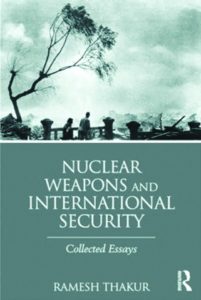
Nuclear Weapons and International Security
Ramesh Thakur
Routledge (2015), Rs14,597
This volume brings together more than three decades of research and writings by Professor Ramesh Thakur on the challenges posed by nuclear weapons.
Following an introduction to the current nuclear state of play, the book addresses the challenge of nuclear weapons in three parts. Part I describes the scholar-practitioner interface in trying to come to grips with this challenge, the main policy impact on security strategy, and the various future nuclear scenarios. Part II addresses regional nuclear challenges from the South Pacific to East, South and West Asia and thereby highlights serious deficiencies in the normative architecture of the nuclear arms control and disarmament regime.
In the third and final part, the chapters discuss regional nuclear-weapon-free zones, NPT anomalies (and their implications for the future of the nuclear arms control regime) and, finally, assess the global governance architecture of nuclear security in light of the three Nuclear Security Summits between 2010 and 2014. The concluding chapter argues for moving towards a world of progressively reduced nuclear weapons in numbers, reduced salience of nuclear weapons in national security doctrines and deployments, and, ultimately, a denuclearized world.
‘Ramesh Thakur is one of the few internationally renowned authors who has written on nuclear weapon issues in a coherent, consistent and cogent manner so that the most complex issues are presented to both the academic and the general reader objectively and lucidly…this is an indispensable volume for students, diplomats and the general reader as a framework of reference on one of most vital issue of our times,’ says Jayantha Dhanapala, former UN Under-Secretary-General for Disarmament Affairs 1998–2003.
‘This essay collection consolidates Ramesh Thakur’s reputation as one of the most knowledgeable and eloquent world authorities on nuclear weapons issues, showcasing nearly 30 years of outstanding scholarship and addressing some of the most serious challenges that have confronted the nuclear non-proliferation regime. It will appeal to any reader seeking a lively, balanced and well-informed analysis of the nuclear past, and concerned – as we all must be – for the nuclear future,’ endorses Gareth Evans, Convenor, Asia Pacific Leadership Network (APLN) and Co-Chair, International Commission (ICNND) on Nuclear Non-Proliferation and Disarmament.
‘Ramesh Thakur has written extensively on issues of nuclear disarmament and arms control. In these collected essays, the first from 1986 and the latest from 2014, he sustains a consistent voice, eloquent and extremely well informed,’ says Lawrence Freedman in International Affairs in January 2016.
Ramesh Thakur is Director of the Centre for Nuclear Non-Proliferation and Disarmament in the Crawford School of Public Policy, The Australian National University. A former United Nations Assistant Secretary-General, he is the Editor-in-Chief of Global Governance and the author/editor of 50 books and 400 journal articles and book chapters, including, most recently, The Group of Twenty (G20) (Routledge, 2013); Nuclear Weapons: The State of Play (2013); and The Oxford Handbook of Modern Diplomacy (2013).

